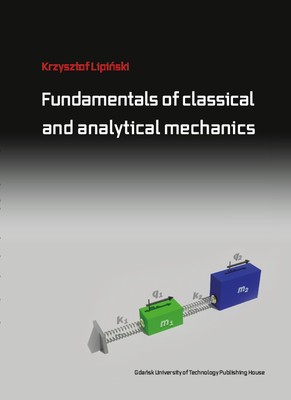
mechanika
Fundamentals of classical and analytical mechanics
Lipiński Krzysztof
ISBN/ISSN: 978-83-7348-831-1
Wydanie: 1
Rok publikacji: 2021
Stron: 324
Słowa kluczowe: simplified theory of gyroscope, Lagrange proposed reformulation of mechanics, theory of vectors, kinematics of particles, dynamics of particles, spherical and general motion of rigid bodies
Opis:
view profile (MOST of Knowledge) – Krzysztof Lipiński
Książkę można zakupić w e-sklepie Politechniki Gdańskiej.
The primary intention of Author of the present book was to draw up a monographic picture of the contemporary attempts used to describe the Newtonian and Lagrangian Mechanics. But concurrently, the book can be recognized as a supplementary educational material, useful for the graduate courses in Mechanics taken by students majoring in Mechanical Engineering, Civil Engineering or Physical Science.
A short synopsis of the subsequent chapters follows:
- Few words of introduction focusing on the domain, branches and the primary assumptions of mechanics;
- A brief introduction to the fundamental concepts and principles of algebra of vectors;
- Kinematics of particles, mainly focused on non-Cartesian coordinates used in mathematical descriptions of kinematics;
- Dynamics of particles; focused on Newton’s laws of motion; motion of particles in one and in three dimensions; dynamics expressed in inertial and non-inertial frames of reference; the principles of linear momentum and of angular momentum of particle; work and energy principles;
- Chapter 5. Kinematics and dynamics of spherical motion of rigid bodies; Euler’s angles; angular velocities and angular accelerations; conical surfaces of angular velocity vectors, steady precession, angular momentum of bodies in their spherical motion, Euler’s equations of dynamics for bodies in their spherical motion; kinetic energy formulae;
- Kinematics and dynamics of general motion of rigid bodies; linear velocity and linear acceleration of points that belong to the same body; linear and angular momentum of rigid body; Newton-Euler’s dynamics equations; kinetic energy;
- Simplified theory of gyroscope;
- Mechanics expressed with use of Lagrange’s formalism; constraints and the constraint equations; main principles used in classifications of the constraints; generalized coordinates; virtual displacements and consequences of the virtual work principle; virtual velocities and the virtual power; generalized forces and the generalized equation of dynamics (d’Alembert’s principle); two types of Lagrange’s equations; selected alternative principles of equilibrium.
Pobierz spis treści
Zakup publikacji:
| format | cena netto | cena brutto | dostępność |
|---|---|---|---|
| książka | 33,00 | 34,65 | dostępne |